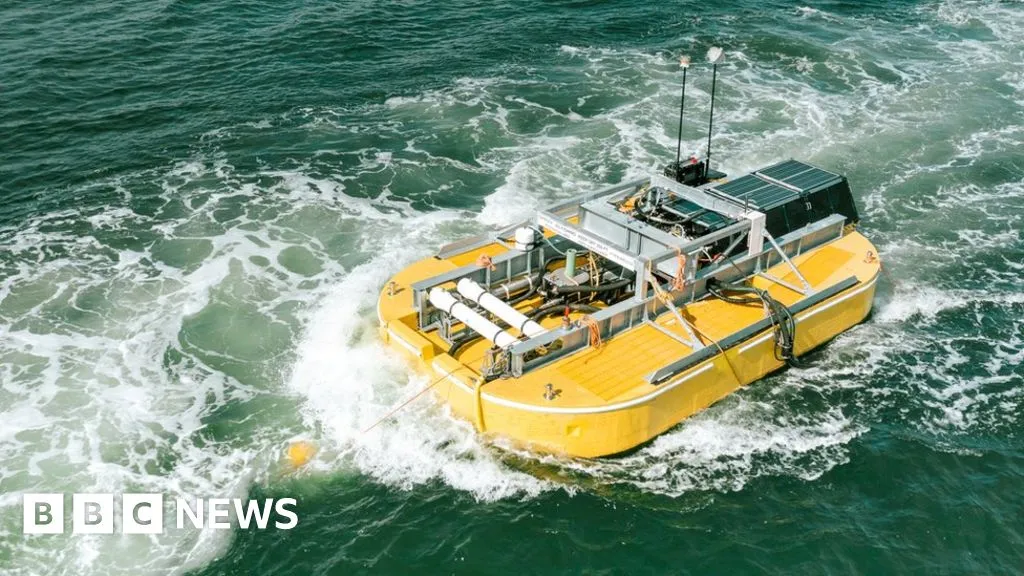I’m actually a lot more hyped about this one than the last article that was posted a lot here. This one is actually in production and cities in CA have purchased them, so we’ll get to see how they function in the real world soon.
A big question is what the lifespan and maintenance needs are for a device that is exposed to a lot of wave energy. We’ll see.
This is the best summary I could come up with:
While large, shore-based desalination plants typically require vast amounts of energy to remove the salt, Oneka’s small units are powered solely by the movement of the waves.
If this is not properly diluted before being discharged back into the sea, then it can create “dead zones” - areas where the salt levels are too high to support marine life.
Oneka’s floating desalination machines - buoys anchored to the seabed - use a membrane system that is solely powered by the movement of the waves.
The buoys absorb energy from passing waves, and covert it into mechanical pumping forces that draw in seawater and push around a quarter of it through the desalination system.
Louise Bleach, Desolenator’s vice president of business development, adds that global shortages of fresh water are making it ever more valuable.
Chedly Tizauoi, a professor of chemical engineering at Swansea University, is an expert on water supply and treatment systems.
The original article contains 866 words, the summary contains 153 words. Saved 82%. I’m a bot and I’m open source!
Not sure if this is more resource efficient than solar powered on land, given the small scale (=inefficient) and the additional complexity from being the seawater all the time. Oh and all the handling, like pipes to transport it back to land from all those tiny things.
why not combine offshore wind power and desalination? The larger scale of the bigger wind turbines offers sufficient power to operate a more efficent desalination machine.
That’s great but we need to take the salt out of the ocean as well, otherwise it will be bad for marine life
The brine that is produced is mixed back in with the three quarters of seawater that the buoys pull in but hasn’t gone through the membrane. This is then released back into the sea. “It’s only about 25% saltier than the original sea water,” says Ms Hunt. “It’s a much lower concentration of brine compared to traditional desalination methods.”
Thats still bad, just take the saline solution out as well in a different pipe and make salt from it, you can just sell it or store it somewhere.
My limited understanding of the process lets me assume that it is an open system on the ocean side and thus there is not really a way to capture the concentrate.
However I also doubt that this is a real issue. These are rather small units that even in large scale deployments would be spread over a large area that is highly agitated by waves.
Compared to the total volume of the ocean this concentrate is really insignificant and with other systems it is really more of a mixing problem than that the concentrate is actually harmful at the location it is produced.
On the other hand, on land salt brines can be very environmentally damaging, so the idea to take them out of the ocean is rather misguided.
Compared to the total volume of the ocean this concentrate is really insignificant and with other systems it is really more of a mixing problem than that the concentrate is actually harmful at the location it is produced.
Thats what they said about co2 as well…
On the other hand, on land salt brines can be very environmentally damaging, so the idea to take them out of the ocean is rather misguided.
Yes i don’t meant for it to be just piled up somewhere, you could put it in old mines, especially salt mines, or at least put in some wear houses where it can’t just go into the ground or get washed away
Thats what they said about co2 as well…
Main difference being that this is not about mining salt and dumping it in the ocean…
Yes but there is always more salt being added naturally and artificially, if we take out water as well and leave the salt it will make it more salty over the years, shure, not from one year to the next, but over long therm it will be problematic.
The water we take out also flows back into the ocean for the most part and currently a lot of non-salty water is entering the oceans from melting glaciers, so making the oceans too saltly is really the opposite of what is a problem right now.




